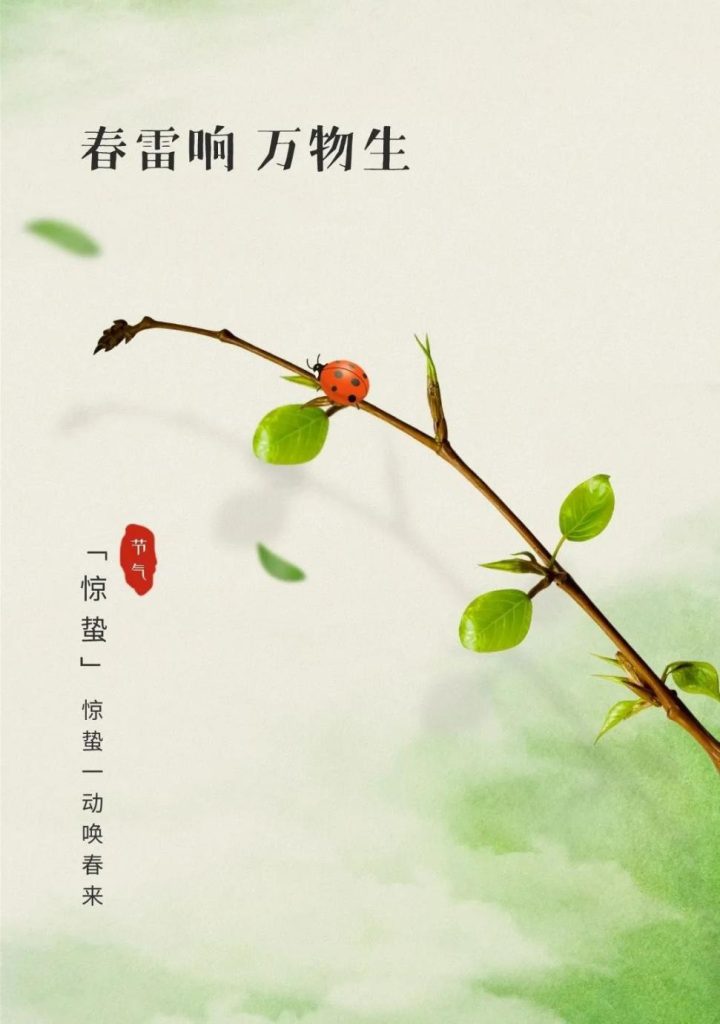

After ‘Jingzhe’, the Waking of Insects, it means that spring has really begun!
At this time, yang energy rises, temperatures warm up, and spring thunder begins. Apart from the cold and icy winter scenes still prevailing in the northeast and northwest, most regions in China are already bathed in vibrant spring colors.
However, during this period, the temperature fluctuates, it is the season of high incidence of influenza, and the air humidity does not increase significantly. People may still experience symptoms of excessive internal heat, feeling dry and uncomfortable.
When the seasons change and the cold and warm alternate, we must adjust our physical functions to resist diseases.
In spring health preservation, prioritizing liver nourishment is essential.
Teach you 4 tips to make your body and mind feel comfortable.
In spring, it is essential to nurture the liver because the liver primarily handles functions related to dispersion and blood storage. It prefers smoothness over stagnation.
Therefore, prioritizing emotional well-being is crucial for liver health. Regular physical activity not only promotes smooth circulation of qi and blood but also accelerates metabolism, serving as an effective method for emotional regulation.
Dr. Dong Lei from the Geriatrics Department of Jiangsu Provincial Hospital of Traditional Chinese Medicine once published an article stating that performing a few simple movements regularly can also contribute to liver health. The methods are straightforward.
1.Gently Press the Eyelids
The liver meridian is connected to the eyes, and nurturing the liver begins with caring for the eyes. Dry eyes indicate insufficient liver essence and blood. Tearing in windy conditions suggests impaired liver contraction. To calm restlessness and irritability, close your eyes, lower your breath, and gently press the eyelids with your index finger until the eyeballs feel warm and slightly swollen.

2.Rotate the Eyeballs
Fix your gaze on a distant large object. Move your eyes in a circular motion from left to up, then right, down, and back to the left, completing a full circle. Remember to keep your head still while only moving your eyeballs. Perform ten rotations in both clockwise and counterclockwise directions to alleviate eye fatigue.
3.Neck Rotation
After working for an hour, rotate your neck gently and tap the muscles around your neck. This relieves muscle fatigue and enhances cerebral oxygen supply. You’ll experience an instant mental clarity, and it also has a positive effect on neurasthenia.
4.Dry Massage for the Legs
Cross your hands tightly around the base of one thigh, applying gentle pressure as you rub downward toward the ankle. Next, move upward to the thigh root, or you can knead the calf muscles by firmly gripping the lower leg with both palms and rotating it.
Of course, if these methods are combined with eating reishi mushrooms, they can yield even more effective results with less effort.
Reishi mushrooms, revered since ancient times as a premium liver tonic, are documented in the Compendium of Materia Medica as having the properties of brightening the eyes, replenishing liver qi, and tranquilizing the spirit. Contemporary research has further confirmed their protective effects on the liver, including enhancing detoxification capabilities, safeguarding liver cells, and reducing hepatic fat accumulation. Long-term consumption yields significant results.

Three Key Points to Remember for Health During ‘Jingzhe’ (Waking of Insects):
1.Prioritize Consuming Pears
The tradition of eating pears during ‘Jingzhe’ symbolizes protection against illnesses. From the perspective of traditional Chinese health practices, after ‘Jingzhe,’ the climate tends to be dry, making people susceptible to coughs and external pathogens. You can consume pears in various ways: raw, steamed, juiced, or as part of culinary preparations. Pear is cold in nature and sweet in taste, benefiting the lungs by relieving coughs and nourishing Yin while clearing internal heat.

2. “Spring Covering” During ‘Jingzhe’ to Ward Off Colds
“Wind is the root cause of many illnesses.” Wind-related ailments are most rampant during the four solar terms: Dahan (Major Cold), Lichun (Beginning of Spring), Yushui (Rain Water), and Jingzhe (Waking of Insects). When wind pathogens invade, symptoms may manifest as headaches, dizziness, and sore shoulders.
Therefore, during the ‘Jingzhe’ period, it’s crucial to practice ‘spring covering’, especially for the head and back. Protecting these areas from cold is essential.
3. Boost Yang Qi: Early to Bed, Early to Rise
“Staying up late harms the liver.” During the season most conducive to liver health, it’s advisable to avoid burning the midnight oil. The period from 11:00 PM to 3:00 AM, known as the ‘Zi’ (Rat) hour and ‘Chou’ (Ox) hour, is when the liver undergoes optimal repair. During this time, liver function operates efficiently, leading to natural promotion of the ascending Yang Qi.
Under the spring sunshine, with willows gently swaying, consider inviting a few good friends to gather some organic Reishi slices from the Mount Wuyi, brew a pot of Reishi tea, and let the tea infuse the romantic spring ambiance. Quietly savor the health bestowed by Reishi.

Reference
“Spring is the ‘golden period’ for liver health; those with liver issues should definitely take note!” – Health Times, February 22, 2024.



